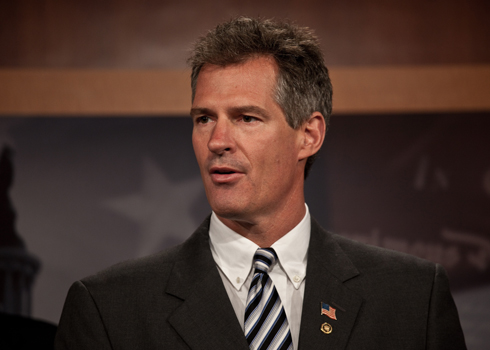Sen. Scott Brown (R-MA) is the new, cool thing in Washington, and the model Republicans keep citing on the campaign trail as the future of the party. But the Democrats seem to be frequently asking, “What can Brown really do for you?”
Brown is a cause célèbre among conservatives, sparking spontaneous cheering from GOPers at the mere mention of his name, but it’s his moderate credentials that are getting him attention these days. After all, he was elected in what had been — until this winter — a solidly blue state, and if he wants voters to send him back he’ll need to appeal to their more liberal sensibilities. Brown reportedly raised more than $1 million in the most recent fundraising quarter, even though he’s not up for reelection until 2012 — a sign that he knows he’s going to have a battle on his hands. That’s one reason Brown has allowed Democrats to woo him on big domestic policy bills.
Since taking office in February following a special election that rocked the nation, Brown has jumped in with bipartisan spirit on several key issues, while dashing Democratic hopes on others. It’s led to some hard feelings on the part of conservatives who once trumpeted his candidacy. Tea Party Nation wrote members in an email obtained by TPM that conservatives “feel betrayed by what they realize now is a moderate Republican, not the conservative they wished for.”
Here’s TPM’s list of the five key issues where Brown’s vote matters most.
1. Financial reform
The Senate gave final approval to a major overhaul of Wall Street regulations, a compromise hammered out thanks in large part to Brown. Banking Committee Chairman Chris Dodd (D-CT) singled out Brown for praise in announcing the agreement, and we hear some progressive groups may even thank the Republican for his vote.
2. Jobs legislation
Of course, financial reform is not the first time Brown has joined with the Democrats. He’d been in office a matter of days when he voted in favor of a procedural motion to end the Republican-led filibuster of a jobs bill. His supporters turned on him, with even tea party activists saying he’d greatly disappointed their cause. Brown’s Facebook page was overrun with complaints, with one man even threatening to un-friend him.
Democrats hope to convince him to do the same thing and stop a filibuster over extending unemployment benefits.
3. Campaign finance
But Democrats who might have been grateful that Brown gave them those assists are miffed that yesterday he announced he won’t support a new campaign finance measure aimed at requiring more disclosure and transparency about election spending because it isn’t transparent enough. The so called “Disclose Act” is a response to the Supreme Courts’ Citizens United ruling earlier this year.
Even MoveOn.org attempted to get Brown on board, saying that while GOP leadership opposes the bill, “Senator Brown can stand up to this pressure and make sure this election counts for most Americans or he can side with the party bosses and protect corporate interests.”
Good government groups have been pressuring Brown, and Democrats admit privately they needed his support for the measure to have much chance at passing the Senate. But yesterday Brown wrote a letter to the Campaign Legal Center, Common Cause, Democracy 21, League of Women Voters, and Public Citizen, saying he couldn’t support the Disclose Act.
Brown used standard GOP talking points in his letter, saying the bill “advances the political agenda of the majority party and special interests in an effort to gain a tactical and political advantage little more than 100 days before an election.” He cited the McCain-Feingold measure to overhaul campaign finance rules, which did not go into effect until the next election cycle, and said the Disclose Act “changes the rules in the middle of the game to provide a tactical advantage to the majority party.”
4. Health care
Who can forget he signed autographs on the campaign trail with “41” — as in, he’d be the 41st Republican senator who would keep health care reform from passing. Brown kept his promise, but the law passed anyway thanks to reconciliation. However, unlike some of his GOP counterparts, Brown isn’t out there on the Freedom Trail crusading for a repeal of the new law.
5. Immigration and climate change
It’s probably no surprise the White House is aggressively courting Brown as an ally on this issue, especially after Sen. Lindsey Graham (R-SC) refused to back anything before the elections. (Obama’s even hinted he might meet Brown on the basketball court for a pickup game.)
Brown was at the White House with President Obama just a few weeks ago speaking about the unemployment insurance issue. Obama has personally phoned Brown from the Oval Office and Air Force One to make his case for a comprehensive immigration bill (Democrats think he’s gettable on that one) and on a bipartisan climate change measure.
Sen. Olympia Snowe, move over. As Brown manages this delicate balance of being a national conservative icon who can appeal to Democratic voters back home, expect to see his name come up more and more as the “key” vote on major issues.









